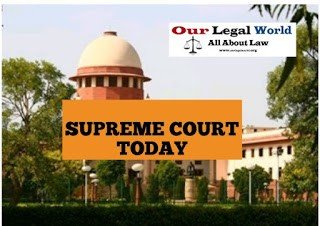5 Important Judgments Supreme Court February 11, 2019
1. The State of Uttar Pradesh v. Faquirey
The Indian Penal Code, 1860 – Section 302 – Murder – Voluntary provocation on the part of the offender cannot come to the rescue of the accused to claim that he is not liable to be convicted under Section 302 IPC.
According to Exception I to Section 300 IPC, culpable homicide is not murder if the offender causes the death of the person who gave the provocation, whilst deprived of the power of self-control by grave and sudden provocation. It would be relevant to refer to the First Proviso to Exception I which provides that the provocation should be one which is not sought or voluntarily provoked by the offender as an excuse for killing or doing harm to any person. No overtact is alleged against the deceased by which it can be stated that the Respondent was provoked. From the proved facts of this case it appears that the provocation was voluntary on the part of the offender. Such provocation cannot come to the rescue of the Respondent to claim that he is not liable to be convicted under Section 302 IPC.
2. Varinder Kumar v. The State of Himachal Pradesh
The Narcotic Drugs and Psychotropic Substances Act, 1985 – Section 20(ii)(c) – The law laid down in Mohan Lal v. State of Punjab, AIR 2018 SC 3853 is not allowed to become a spring board for acquittal in prosecutions prior to the same, irrespective of all other considerations – All pending criminal prosecutions, trials and appeals prior to the law laid down in Mohan Lal (supra) shall continue to be governed by the individual facts of the case.
Human Rights – Individual rights of the accused are undoubtedly important. But equally important is the societal interest for bringing the offender to book and for the system to send the right message to all in the society —be it the lawabiding citizen or the potential offender. ‘Human rights’ are not only of the accused but, extent apart, also of the victim, the symbolic member of the society as the potential victim and the society as a whole.
3. Anjali Arora v. Union of India
The Constitution of India, 1950 – Article 32 – Writ of Mandamus – For grant of pay scale on the basis of parity – The Writ Petition is dismissed.
4. Swpan Kumar Chatterrjee v. CBI
Successive applications for recall of a witness under Section 311 of the Code of Criminal Procedure should not be encouraged.
“Where the prosecution evidence has been closed long back and the reasons for non-examination of the witness earlier is not satisfactory, the summoning of the witness at belated stage would cause great prejudice to the accused and should not be allowed.”
The Bench Justice AK Sikri and Justice S. Abdul Nazeer
5. ASHWINI KUMAR UPADHYAY v. Union of India
The Supreme Court directed the National Commission for Minority (NCM) to take a decision within three months on a representation seeking laying down of guidelines for defining the term ‘minority’ in the context of state-wise population of a community.
A bench headed by Chief Justice Ranjan Gogoi








![Tax Law Internship at Legum Attorney [Chamber of Ashish Panday], Delhi : Apply by 15th May 2025](https://www.ourlegalworld.com/wp-content/uploads/2025/05/IMG_0113-min.png)

